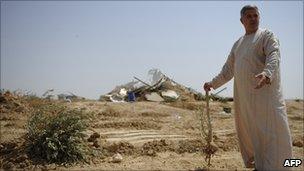Israel police raze 'illegal' Bedouin village in Negev
- Published
Police arrived at dawn and destroyed 30 to 40 makeshift homes
Around 300 Bedouins living in Israel's Negev desert have been made homeless after police raided their village and razed their homes.
Israeli activists said 1,500 police arrived in Al-Arakib village at dawn.
They destroyed 30 to 40 makeshift homes and uprooted hundreds of olive trees belonging to the villagers, they said.
Police spokesman Mickey Rosenfeld said the homes had been "illegally built" and were destroyed in line with a court ruling issued 11 years ago.
"Several hundred people were taken back to the Rahat area where they originally came from," he told the AFP news agency, referring to a nearby Bedouin town in Israel's arid south.
More than 150,000 Bedouin live in Israel, mostly in and around the Negev desert.
Around half live in villages that are not recognised by the state, and have no access to municipal services like water and electricity.
Many live in extreme poverty.
Land battle
At dawn on Tuesday, women and children in Al-Arakib watched as Land Administration bulldozers demolished their houses, Israeli press reports said.
Minor scuffles erupted as the villagers and around 150 rights activists tried to stop the police from carrying out the demolitions, said Chaya Noach, head of the Negev Coexistence Forum, a group fighting to protect the rights of the Bedouin in the Negev.
"We were stunned to witness the violent force being used," Al-Arakib spokesman Awad Abu-Farikh told Israeli newspaper Yediot Ahronot following the razing.
"This operation is the first step in the uprooting of many villages. We shall return to our villages, build our homes and not leave this place."

Olive trees were uprooted and orchards destroyed, activists said
The authorities say all the homes are illegal, built without permission.
The Bedouin say they have lived in the area since before the foundation of the state of Israel.
They resist efforts to re-settle them in towns and villages, saying it goes against their traditional way of life.
A Land Administration official, Shlomo Tziser, told Yediot Ahronot the officers were implementing a final court order for the evacuation of the area.
"Today we shall evacuate them and should they return we'll do it again," he said.